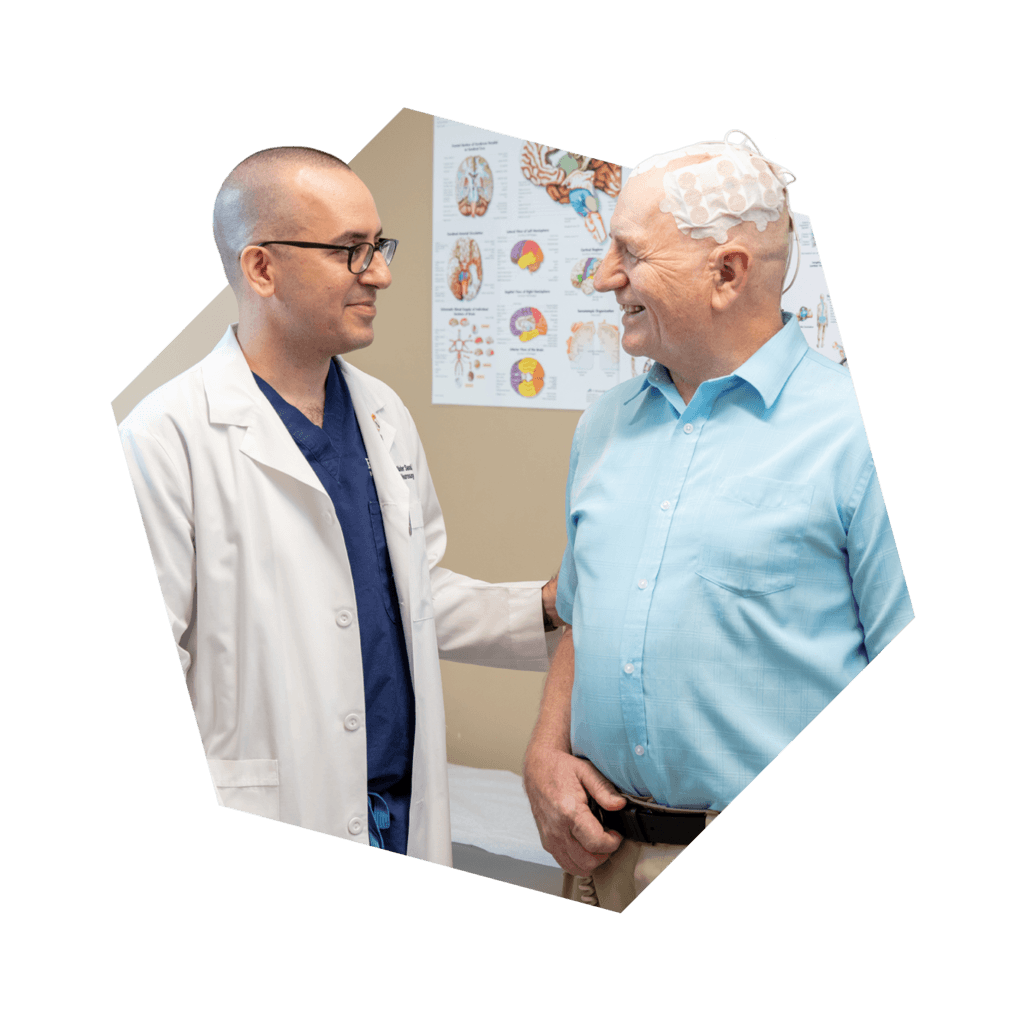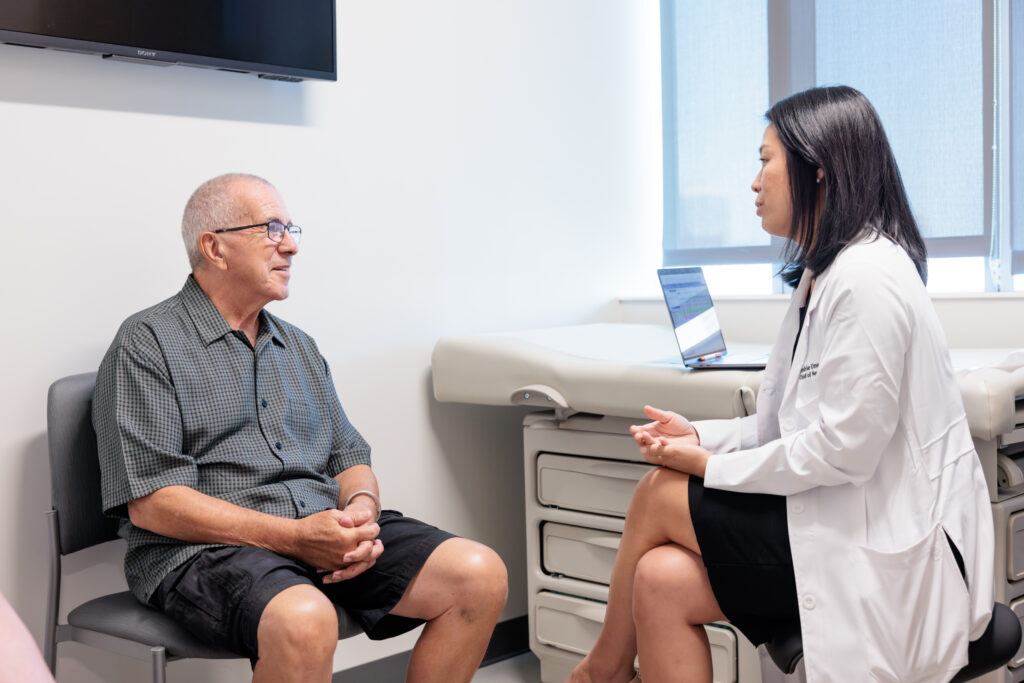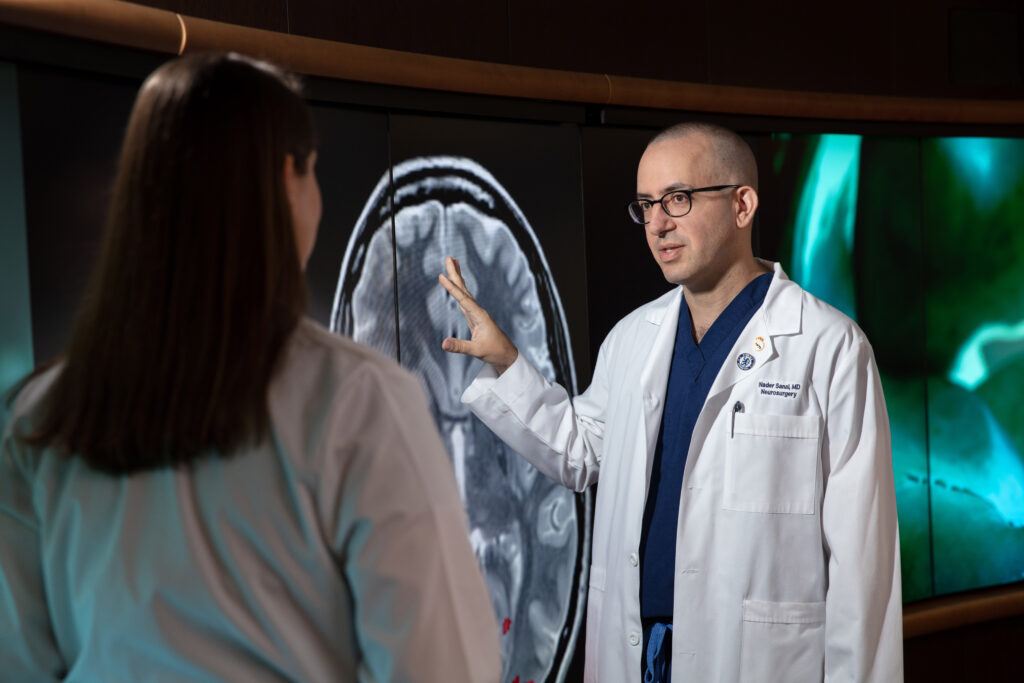Neuro-Oncology
Neuro-Oncology for Brain Tumors
Neuro-oncology is a specialized branch of medicine that focuses on the diagnosis and treatment of brain tumors and other cancers of the central nervous system (CNS). Neuro-oncologists are medical doctors who specialize in the comprehensive care of patients with brain tumors. They have expertise in understanding the unique characteristics of brain tumors, their behavior, and the complex interactions between the tumor and the nervous system.
Neuro-oncologists within the Ivy Brain Tumor Center and Department of Neuro-Oncology at Barrow Neurological Institute access robust scientific and clinical data to tailor individualized treatment strategies for patients. Our neuro-oncologists meticulously assess each case, considering various factors such as tumor type, stage, and patient health, to determine the most effective course of action. They closely monitor patients’ progress, ensuring that any new symptoms or concerns are promptly addressed. The response to the treatment is assessed by a combination of how you are doing clinically (symptoms, exams) and radiographically (usually MRI scans).
Read on for the most common interventions used to manage symptoms and enhance the overall well-being of brain tumor patients throughout their treatment journey.
Active clinical trials enrolling patients at the Ivy Center
Chemotherapy and other drug therapies
Depending on your tumor type, chemotherapy may be recommended as part of your treatment plan. Chemotherapy is a medicine that kills tumor cells. Traditional chemotherapies are “cytotoxic” (toxic to cells) medicines and work by destroying tumor cells. These chemotherapies disrupt the tumor cells’ ability to reproduce to slow or stop tumor growth. An example of common cytotoxic chemotherapy is temozolomide. Chemotherapy may be combined with radiation, used alone or in combination with other medications or devices. Typically chemotherapy will begin after an adequate time to heal after surgery.
Some drug therapies against brain tumors may be targeting a specific target to cause tumor cells to die. Many targeted therapies are still being studied in clinical trials. The drug target may involve metabolic pathways or specific gene mutation or defect within the tumor to disrupt the tumor’s growth behavior. Other therapies may be designed to boost your body’s immunity against tumor (immunotherapy). An example of targeted drug therapy used commonly in brain tumors is called bevacizumab (brand name: Avastin), a medication administered intravenously.

Tumor Treating Fields (Optune)
Tumor Treating Fields (Brand name: Optune®) are low-intensity, alternating electrical fields that interfere with cancer cell division, which slows or stops cancer cells from dividing and may destroy them. Optune is a wearable and portable device that can be incorporated into daily life. Optune is FDA-approved for adults with glioblastoma multiforme (GBM). Optune is prescribed by certified physicians as part of a treatment plan for the appropriate patients.
Tumor Molecular Profiling
Molecular profiling is a way to test tumor cells to look for mutations (changes) in the tumor’s genetic makeup. Scientists at the Ivy Center test each patient’s tumor tissue to identify its unique genetic composition. This information helps tailor treatment with chemotherapy, targeted therapy or clinical trial options. Molecular testing ranges from a test specific to detect certain mutations to a larger testing panel sometimes called Next-Generation Sequencing. This is a promising area of brain tumor research to identify targets to treat in a tumor. Your oncology team and neurosurgeon can talk with you about the details of the testing during your office visit.
Clinical Trials
The Ivy Brain Tumor Center is committed to pushing boundaries in brain cancer research and treatment. We conduct cutting-edge, experimental studies never seen before in neuro-oncology. As the world’s most extensive Phase 0 clinical trials program, we are pioneering a novel approach – accelerated, early-phase clinical trials that quickly identify drugs that deliver on their promise while rapidly eliminating those that do not.
Every Ivy Center drug combination tests new mechanisms never before trialed in brain tumor patients. Patients come to us from around the world to gain access to our clinical trials. Many of our patients find treatment options when they have been told there are none.
Most clinical trials at the Ivy Center are precision medicine studies. Each patient’s tumor is first defined by its genetic abnormalities, and then a treatment plan is selected for the patient’s specific molecular composition.
Seizure Management
A seizure is a sudden and abnormal electrical activity in the brain. It can manifest in various ways, including convulsions, repetitive movements, altered consciousness, sensory disturbances, problems with speech, visual disruption, or a combination of these symptoms.
Seizures can be related to brain tumors due to the presence of the tumor itself. Brain tumors can interfere with the regular electrical activity of the brain tissue surrounding them. Tumors can disrupt the balance of chemicals and cells that regulate brain function, leading to abnormal electrical discharges. This disruption can trigger seizures. Seizures associated with brain tumors can vary widely in type and severity.
Not everyone with a brain tumor will experience seizures, and the presence of seizures doesn’t necessarily indicate the presence of a tumor. However, seizures can be one symptom that leads to the discovery and diagnosis of a brain tumor. Management of seizures in individuals with brain tumors often involves a combination of treatments, including antiepileptic medications and addressing the underlying tumor through surgical or other medical interventions.

Electroencephalogram (EEG)
An Electroencephalogram (EEG) measures the brain’s electrical activity using small sensors placed on the scalp. It records the patterns of electrical signals produced by brain cells, which reflect different brain states and activities. In brain tumor care, EEG helps detect abnormal brain activity, such as seizures, and assists in diagnosing and monitoring various neurological conditions. EEG is valuable for mapping brain functions, guiding treatments, and assessing responses to therapies. This painless and non-invasive test plays a crucial role in understanding brain health and optimizing patient care.
Diet Modification and Supplements
Advances in science about understanding glioma biology have led to increased targeted therapy in clinical trials. Scientists have found that virtually all tumor cells have altered metabolism. It is thought that tumor cells have an increased reliance on glucose, suggesting that treatments affecting cellular metabolism may be an effective way to improve current brain tumor treatments. Some dietary regimens and supplements have some promising results in animal models and/or purported uses against cancer. One example is a ketogenic diet, a high-fat, moderate protein, low carbohydrate, or glucose diet. Scientists hypothesize the decrease in carbohydrates (glucose) causes ketosis in the body, which is the metabolic environment that may have an antitumor effect. If you are interested in the ketogenic diet, you should seek education from dieticians or nutritionists. Barrow has no published clinical trial information that the diet helps the antitumor effect of chemotherapy and radiation. Although ketogenic diet is a safe add-on treatment option with proper guidance, please discuss your interest with your treating oncology team as some supplements can interfere with your treatment, or increase risk of adverse events.
Barrow Neuro-Oncologists
Patients under the care of neuro-oncologists at the Ivy Brain Tumor Center and Barrow Neurological Institute can expect comprehensive and compassionate support. The collaborative efforts of the medical team aim to optimize treatment outcomes and enhance the quality of life for individuals affected by brain tumors. Through ongoing research and a commitment to excellence, our neuro-oncologists strive to provide patients with access to the latest advancements and innovative therapies, ultimately improving the prospects and comfort of those facing brain cancer.
Medically Reviewed by: Yoshie Umemura, MD






